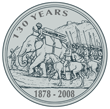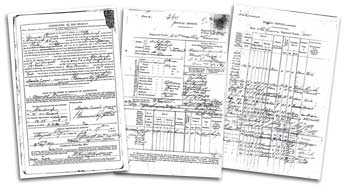 |

 |
|
|
 |
|
The Afghan War Database Project
A biographical database of participants in the Anglo-Afghan War 1878-1879-1880
If you are able to contribute details of an individual to be remembered on the database, then please read more about the project below. If you would like to search the database, then click this button to begin... If using information from this database, please quote your source as 'The Second Anglo-Afghan War Database Project, www.angloafghanwar.info'. This information is made available on the understanding that it will be used respectfully and responsibly. Definitive accuracy cannot be guaranteed. Database collected and compiled by Garen Ewing. What is the database? The Second Afghan War database is a collection of individuals who took part in the campaign in Afghanistan from November 1878 to September 1880, and into early 1881. What separates it from being just a list of names is that most entries include brief biographical information, telling where they came from before the war, and where their lives took them after it, thus providing some context and perhaps revealing its influence. Rather than harvesting the names from a medal roll, entries come from the descendants of soldiers and also from medal collectors if the medals are known to still exist (see data protection). At the moment, the majority of entries are researched by myself - when I have some spare time. While many officers have their biographical details easily available, Privates and NCOs are often forgotten, and one of the few sources for them to be remembered is through family historians - so your help is vital. The database acts as a historical record and as a useful resource for researchers, now and in the future, as well as a modern memorial. When it is of a substantial size it will be made available to one or more institutions for posterity, being updated as time goes on. If you have an ancestor who served in this campaign, or have come across anyone during your research who qualifies (of any nationality), then please get in touch and contribute to this important historical record. How can you help? If you have an ancestor or know of someone who served during the Second Afghan War, then you can send me some details for inclusion in the database. This only needs to be a brief biographical record, I wouldn't ask you to reveal all your family secrets! I am also most interested to hear any family stories or anecdotes that are connected with this event, letters, diaries, or further avenues of research you think may be of interest. How can the project help you? First of all, I don't like to think of any Afghan war participant being left out of the project and 'forgotten'. In more direct ways, new descendants may come along and be able to add more information about an individual, if not to the project, then to your own research. Once I am aware of a descendent, it is possible I may see your ancestor's medals for sale, in which case I will let you know (however, I cannot put you in touch with medal owners if they are already in a collection, unless I have the current owner's express permission to do so - please see data protection below). In return for you contributing a person's details to the database, I can give you detailed information of what their regiment did in the Afghan war, thus helping to fill out his story for your own research. What information do you need for a participant? After the person's name, there are two areas of information I am interested in which go to make up the biography of a participant in the war. Military data would include their regiment, service number, rank, and any previous or subsequent campaigns they were involved with. Personal data would include their birth and death dates and places, occupation (before and after their service), if they married and had a family and associated details (at your discretion), and anything else you think would be of interest that you are willing to share. If you have a photograph of the participant, from any time in his life, then they are also being added to the database and a copy (or scan) is most welcome. Here are a couple of examples of database entries:
How can I submit information to the database? You can contact me by email or send the information to me through the post. Please see my contact details for more information. How is the database project funded? At the moment the project and all my research is funded privately by myself. If you would like to know more about making a small contribution to the project then click here for more information, but there is absolutely no obligation to do so as there is no fee associated. This research project is for the benefit of anyone and everyone with an interest in the era and is non-profit. The database project is committed to providing the best information possible in a respectful way. Its philosophy is one of generosity of historically correct data for the benefit of all. How do I know if someone was in the Afghan war? The safest way to know if an individual took part in the Afghanistan campaign is if they received the Afghan War medal (see more about the medal here). If you do not know if they received this medal then a good guide (but not definitive) would be if they served in one of the participating regiments during the war. Often a family story may tell of an ancestor's part in the war, but you'll know, as a researcher, that these are best proved before accepted. If they took part in Roberts' march to Kandahar then they will also have received the bronze star for this event (see regiments that marched). How do I research someone to find out more? As far as a participant's military history goes you will want to get hold of their army service record from The National Archives, if it has survived (note: these are now available online from Find My Past). In order to get this it will help to know their regiment. If you don't know this then there are a number of routes to find out (besides owning the medals on which these details are engraved).Various vital records may include a person's military details, for instance a marriage certificate could name their regiment, especially if they married while still in service. A child's birth certificate could mention it and so could a census return. If you are able to find a newspaper obituary, this usually details any past military attachments, with varying degrees of accuracy! If you are really stuck then you can get in touch with me as I can reference the Medal and the Casualty Rolls.
There are a number of books and resources available to find out more concerning research. One book I particularly recommend if you are a family researcher is 'Ancestral Trails - a complete guide to British genealogy and family history' by Mark D. Herber, which is available from the bookshop. The National Archives at Kew have some helpful advice on service records and also on muster rolls, another very useful resource. Data Protection and your details When you contact me I will be the recipient of your contact details and will respect their security to the fullest. They will not be passed on to anyone. Should someone contact me with information you might be interested in then I will let both parties know there is a shared interest, and only with the explicit agreement of both will I pass on names and contact details. It will then be up to you to share any data. I may contact you from time to time with new information should I happen across it. I have no interest in obtaining medals from collectors. Collectors may be worried about a soldier's descendants claiming "their" medals. As mentioned above, I will not pass on anyone's details in any circumstance unless permission is given. The building of the database is my only interest, and I treat personal data with the respect and care that is required in our modern world. By submitting a participant's details to me you are agreeing to that participant being included in the database and their biography being made available to fellow researchers in the future. Your contact details will not be published, and biographies will respect privacy when written up. Nearly all of the data shared in the database can be discovered through public research. This project would not be possible without the generosity of researchers who have shared their hard work for inclusion within the database. I am enormously grateful for all your help in building this invaluable resource. I would like to extend a special thank you to those who have contributed more than their fair share, including: Richard Stacpoole-Ryding, Ian McInnes, Jerome Lantz, Mark Sellar, Neil Boulton, Graham Alexander and Irvin Mortenson. |
All original content on this site is © Garen Ewing 2025, unless otherwise stated.
Original images from my own collection and data on this site should not be used without prior permission - thank you.
See about this site for more details.
